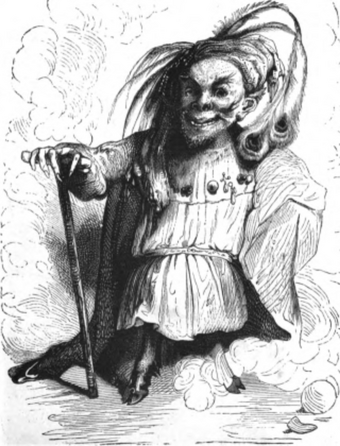Annotation:Devil on two Sticks (The): Difference between revisions
Created page with "[[{{BASEPAGENAME}}|Tune properties and standard notation]] ---- <p><font face="garamond, serif" size="4"> '''DEVIL ON TWO STICKS, THE'''. English, Jig. G Major. Standard tuning ..." |
No edit summary |
||
| (17 intermediate revisions by 4 users not shown) | |||
| Line 1: | Line 1: | ||
---------- | |||
---- | {{TuneAnnotation | ||
|f_tune_annotation_title= https://tunearch.org/wiki/Annotation:Devil_on_two_Sticks_(The) > | |||
'''DEVIL ON TWO STICKS, THE'''. English, Jig. G Major. Standard tuning (fiddle). One part. The melody is unique to London publishers Charles and Samuel Thompson's 1757 country dance collection | |f_annotation=[[File:Asmodeus.png|340px|thumb|right|Asmodeus, or The Devil on Two Sticks]] | ||
'''DEVIL ON TWO STICKS, THE'''. English, Jig (6/8 time). G Major. Standard tuning (fiddle). One part. The melody is unique to London publishers Charles and Samuel Thompson's 1757 country dance collection. | |||
<br> | <br> | ||
<br> | <br> | ||
The title invokes the comic novel '''Le Diable Boiteux''' by [[Wikipedia:Alain-René_Lesage]] (1668–1747) originally published in 1707, translated to English as '''The Devil on Two Sticks''' and published in London in 1708. The demon Asmodeus is the titular '''Devil on Two Sticks''', guiding Don Cleophas Leandro Perez Zambullo through the follies and farces of Madrid and its inhabitants. | |||
'' | |||
<br> | <br> | ||
<br> | <br> | ||
The 'devil on two sticks' (the ''diabolo'') is also a juggling prop that involves a spool and string tossed by two sticks. It was derived from the Chinese yo-yo. | |||
'' | |||
<br> | <br> | ||
<br> | <br> | ||
See also Straight & Skillern's "[[Devil upon Two Sticks (The)]]," a different jig. | |||
|f_source_for_notated_version= | |||
'' | |f_printed_sources=Thompson ('''Compleat Collection of 200 Favourite Country Dances, vol. 1'''), 1757; No. 164. | ||
|f_recorded_sources= | |||
|f_see_also_listing= | |||
}} | |||
Latest revision as of 00:23, 21 January 2023
X:1 T:Devil on two Sticks, The M:6/8 L:1/8 B:Thompson's Compleat Collection of 200 Favourite Country Dances, vol. 1 (London, 1757) Z:Transcribed and edited by Fynn Titford-Mock, 2007 Z:abc's:AK/Fiddler's Companion K:G D2D B2B|ABc B2A|BdD G2G|ABc B2A|B2c ded|c2B A2D| G2G F2F|E2E D2d|BdD G2G|ABc B2A|BdD G2B|cBA G3:||

DEVIL ON TWO STICKS, THE. English, Jig (6/8 time). G Major. Standard tuning (fiddle). One part. The melody is unique to London publishers Charles and Samuel Thompson's 1757 country dance collection.
The title invokes the comic novel Le Diable Boiteux by Wikipedia:Alain-René_Lesage (1668–1747) originally published in 1707, translated to English as The Devil on Two Sticks and published in London in 1708. The demon Asmodeus is the titular Devil on Two Sticks, guiding Don Cleophas Leandro Perez Zambullo through the follies and farces of Madrid and its inhabitants.
The 'devil on two sticks' (the diabolo) is also a juggling prop that involves a spool and string tossed by two sticks. It was derived from the Chinese yo-yo.
See also Straight & Skillern's "Devil upon Two Sticks (The)," a different jig.

